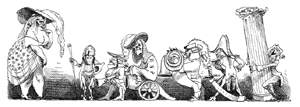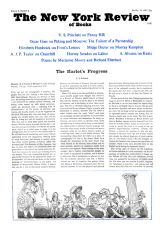Every age gets the pornography it deserves. The people who are now making a fuss about Fanny Hill, John Cleland’s Memoirs of a Woman of Pleasure, do nothing about the real pornography of today—the incitement to violence, torture, maiming, and killing, often topped up with sexual perversity, which are presented with a sickening kind of pleasurelessness, on the screens of television and cinema and in pulp fiction. It can be suggested (as Havelock Ellis once did) that some kinds of pornography are socially useful; they may allay evil desires by acting as a sort of imaginative distraction. They may lead us away from action into harmless fantasy. Whether this is so or not, the real test is not what the average man thinks; it is the test of artistic merit, and if he is called upon to judge, it is the average man’s duty to find out what artistic merit is. He will find himself considering man’s often brilliant exploration of his own imagination. Nothing could be more horrifying and inciting to sadistic action than those terrible pictures of Goya’s called The Fantasies and The Disasters of War; however, one sees, at once, that Goya’s art transmutes them and places them in that area of our minds where the difficult but indispensable moral and civilizing process can operate. The same transmuting process can be seen in the treatment of the classical but surely sordid encounter of Leda with the Swan; in the brothel paintings of Toulouse-Lautrec, in the pathos and laughter of Maupassant’s Maison Tellier. I believe one can see it also in that minor amatory exercise, Memoirs of a Woman of Pleasure. No one is asked to say how meritorious an artist is in these matters, but it is essential for the transmuting element to be recognized.
Since 1749 when it was first published in London, many sensible people have thought that Memoirs of a Woman of Pleasure, usually known as Fanny Hill, had this element. It has its place in the history of literature, not in the history of smut. Smut never lasts. The story is obviously inflaming, but even Jane Eyre or Lorna Doone inflames. Fanny, a country girl abandoned in London, describes how she enters a select brothel—note the word “select”—and goes into prolonged, detailed descriptions of several kinds of sexual adventure and intercourse. In doing so, however, she never utters an obscene word, rarely descends even to colloquialism, never to the clinical; she indeed writes an elaborate literary language that would do credit to any master of baroque and poetic utterance—shall we say Henry James?—spoken in a drawing room. And it is not shabby baroque. The disconcerting thing about the book—as a piece of “pornography”—is that it has charm. Many have thought the intercourse of the sexes brutal even when blessed by the Church; more refined and indeed naturally sensitive or passionate people have found the very opposite. Fanny belongs to the latter category. She is healthy, warm-blooded, delights in her senses, is unashamed in curiosity, and is distinctly self-aware. She is unrepentant in pleasure or lust; but she truthfully perceives—and this, I believe, without the sort of hypocrisy that greater writers like Defoe or Richardson insinuated—that she had physical pleasure in lust but physical and spiritual pleasure in love. Having made a lot of money in her enforced profession about which, in the true practical spirit of the eighteenth century, she is complacent, she marries her first lover: a success story that can be said to be a smack in the face for Clarissa or Pamela.
No one pretends that John Cleland approaches the range or power of Defoe or Richardson as a novelist. His book is, on the other hand, the nearest thing we have to an English Manon Lescaut. But he must be seriously discussed with these writers by the literary critic, for he brings to life an important element in eighteenth-century morality and feeling. Two influences clearly bear on his mind. The first is accidental. Residence in Smyrna as British Consul and later in Bombay appears to have removed from Cleland the morally ruthless, brutal, or comic-brutal attitude to sexual life which is so strong in the aggressive Anglo-American traditions. (Charm, tenderness, a concern for manners in love are pronounced in Oriental works like The Arabian Nights and, despite the clinical dog-Latin of timid translators, in The Golden Lotus.) But the strongest influence on Cleland is that concern for the reform of manners which is the most powerful force in the English novel during the eighteenth century.
Part of this spirit of reform was the expression of Puritan ambition or—more accurately—of the beginnings of middle-class respectability; it began under William III who, like most Dutchmen of that time, was appalled by the barbarity of English social life. The other part was directed to polish, elegance, the refinement of sensibility, and making men and women physically clean and conversible. In the end, the former hardened into hypocrisy and the latter into arid artifice and eventually false sentiment. Especially does the spirit of reform, and the social revolution accompanying it, affect the status of women who begin to emerge as the custodians of society and, at last, of their own persons. Defoe’s Roxana becomes a greedy kept mistress, because she is determined to be as free as any merchant and to be as much master of her person and property as any man. Defoe’s Moll Flanders, thief and doxy and calculating fornicator, sins for one motive only: to attain respectability. She ends as the first Mrs. Grundy of Virginia. Her morality and remorse—like Mrs. Grundy’s—are amiable but suspect. Though frank about their sexual experiences, these ladies take it as it comes and are incapable of describing their inner life.
Advertisement
It was more profitable, as Mr. Peter Quennell says in his excellent introduction, to compare Fanny Hill with Richardson’s heroines Pamela or Clarissa; and also to compare Cleland’s moral attitude with the Hogarth of The Harlot’s Progress. The moral of Pamela is that lovely woman must not stoop to folly; if she does, she will miss both respectability and property. The moral of Clarissa is “Better death”; and of Hogarth’s pictorial chronicle, that a life of libertinage leads to self-destruction. To these violent and general views, Fielding was the aristocratic objector. It was notorious (a large body of non-Puritan opinion agreed) that a life of pleasure did not automatically lead to disaster; that the virtuous Pamela was a sham; and even that Clarissa was one of those peculiar psychological aberrants who are contented with nothing short of rape. Like Fielding (in this way at least), John Cleland holds to the view that manners can be reformed only if one is truthful about private experience and cultivates one’s perceptions and good sense. His story may be shallow, but its content, within its limits, is not.
To this attitude Cleland adds his own eccentricity as a writer. He was a bookish Scot with a Celtic bee in his bonnet. He is eccentric to the point of ridicule. It is true he was a down-at-heel Bohemian who wrote his sensational and daring Fanny Hill to make a quick twenty guineas, when he was bankrupt; yet his real interests were esoteric and solemn. His hobby-horse was not sex but philology. He sought to found a universal language and wrote a Specimen of an Etymological Vocabulary or Essay by means of the Analytic Method, to retrieve the Ancient Celtic.
Mr. Quennell quotes a long passage from this obscure essay, which is dotty but reveals an obsession with the metaphysics of the art of description. Here is a sample of Cleland’s groping mind:
If then, I repeat it, if I am not mistaken in this method of analysing words by an individuation of ideas, syllable by syllable, and through every particle that constitutes those ideas…by means of which the existence of things may be found in their natural records and repositories, words satisfactorily explained so as to convey undeniable truths by implication…
If that particular passage suggests anything it is a fervid preoccupation with metaphor and the associations of words poetic or otherwise—which is not, when one comes to think of it, extraordinary in an eloquent Celt—that inspired the florid and indeed the best passages of sexual description in the book. The evocation of what sexual pleasure is in its particularity and in the imagination, was his strong point. There he succeeded where better and higher-minded writers—D. H. Lawrence among them—have grotesquely failed. Cleland is good about sex because he is good about words. Elegance, energy and kindness, he conveyed.
The absurdity of Fanny Hill lies here also; where “pornography” does not brutalize, it idealizes. The book is, in this sense, an erotic fantasy—and a male fantasy, at that, put into the mind of a woman. The male organ is phenomenal to the point of absurdity. Cleland is carried away by his sexual daydream. So was Casanova, most of the time, for eroticism is a kind of intoxication. But we must remember that Fanny Hill was a sensational book, written as a sensational counterblast from the point of view of privacy to those who were formulating the new public bourgeois attitude to sex. In one sense Cleland is engagingly feminine: the continual reference to clothes, to furniture, to manners is that. But Cleland has the naive male double view that old whores are hardened and corrupt but that young ones, though on the make, are also rescuable—not by pious interference, but through the experience of love. On the whole, one would guess that Hogarth’s view of the bagnio was the correct one; for we notice Cleland is a snob: his brothel is that fantasy, the select brothel with no risk of the eighteenth-century nightmare, the pox; but it is odd that Cleland, who was either wrong, exalted, or cynical, should have had a finer and far less gross sexual sensibility than Hogarth—except possibly in one or two gory sadistic metaphors and in the disagreeable flagellation scene. If that disgusts, it at any rate shrewdly exposes the psychological distress of the neurotic.
Advertisement
Fanny Hill may bore one—she admirs that an ecstatic story like hers may become tedious because there is nothing so tiring as repeated ecstasy—but she leaves no bad taste. If we don’t believe her fairy tale, we believe her feelings. Indeed she conveys the sense of pleasure without guilt. (There, alas, she is no realist.) After the eighteenth century, a book like this could not be written in England. Romantic morality reasserted itself and sexual happiness retired from print into privacy and, indeed, one does not want this private mystery to be exploited or described too often, even by the gifted.
After publication, the real pornographers got to work on Fanny Hill. The book was pirated. The pirates supplied obscene illustrations. (One set of these by Cruikshank must have been good, but it has been lost.) They dirtied the text, added episodes. The illustrations led to prosecutions. But as a minor fantasy, deluding as a guide to conduct, but respectful of our delight in the body, this halfsly, halfingenuous manual is an interesting footnote in the history of the English novel. It reminds one of those improper carvings one sometimes finds under the arms of medieval choir stalls. Immodestly the flesh happily persists.
This Issue
October 31, 1963




